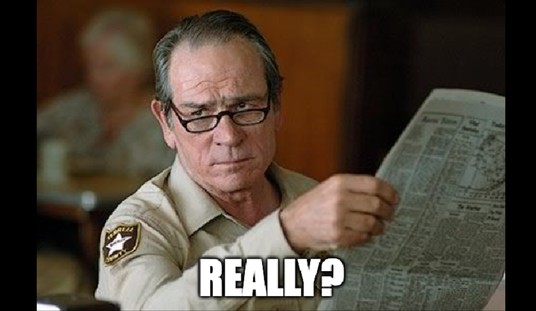It wouldn’t be Independence Day without hot takes from the usual media suspects, and the Washington Post was no exception, taking a look at the global legacy of July 4, 1776, and noting that American independence from Britain helped further colonialism and slavery.
Perspective: It is time to reconsider the global legacy of July 4, 1776 https://t.co/wJG1cmK6N6
— The Washington Post (@washingtonpost) July 4, 2020
The opinion piece obviously mentions slavery in the United States as well as the displacement of indigenous peoples, but it also takes a look at the British Empire after the United States split away and determines that American independence made things worse.
Across the Atlantic, Britain responded to the loss of the 13 colonies by developing a “second,” much larger empire in Asia, Australia and Africa. Both the American and the British Empires post-1776 were structured by racial hierarchy, violence and a systemic devaluation of black and indigenous lives.
…
After America declared independence from Britain, both countries maintained powerful traditions of racism and violence that were distinct and interconnected. The Americans became agents of many of the same British ideas and practices that the colonists had challenged. The United States itself became an imperial power, extending its overseas empire in the last years of the 19th century….
…
The British and American empires mutually reinforced the notion that black and indigenous lives did not matter.
The entangled histories of British and American empire demand that we adopt a wider perspective on what is often framed as a domestic story about race and racism in the United States. After 1776, the United States remained part of an extended global system of white supremacy — one that continues with deadly consequences today.
Recommended
So by splitting from Britain, the colonies began forging their own white supremacist empire, leaving the world with two.
— Laura (@laurakbarr) July 4, 2020
Oh shut up
— Brittany Sellner (@BrittPettibone) July 4, 2020
GFY pic.twitter.com/mVCylcF4H3
— Bill you know the thing McBride (@gilescorey) July 4, 2020
Fuck you.
— I didn't vote for him, so think of a new retort (@jtLOL) July 4, 2020
Hear, hear!
— Green&Gold920 (@green_gold920) July 4, 2020
Trump was right to call you enemies of the people.
— John Hawkins (@johnhawkinsrwn) July 4, 2020
Happy Birthday, Merica! pic.twitter.com/JGZW2mLcZw
— Uri Blago (@UriBlago) July 4, 2020
This is the global legacy of July 4, 1776. pic.twitter.com/qHZtOkT05b
— Uri Blago (@UriBlago) July 4, 2020
This is the legacy: pic.twitter.com/AtVcML23fo
— Midnight Chow (@midnightchow) July 4, 2020
“America symbolizes, above all, freedom and opportunity for ordinary people. That is what makes it a beacon to those in other lands who are seeking freedom and opportunity.” – Thomas Sowell
— Kenny (@Kenny_Sowellfan) July 4, 2020
The ironic thing is, all so-called "journalists" would not be able to practice their trade as they do today had it not been for the global legacy of July 4, 1776.
— Game Theory (@MsGameTheory) July 4, 2020
The ‘central paradox’ of America being a society founded upon slavery is ludicrous. In 1776, slavery was commonplace the world over. By declaring the equality of all men, the US challenged that status quo. The founders knew in time that this tension would undo slavery
— Joseph Aronoff (@jaronoff38) July 4, 2020
Enemy of the people says what?
— Catturd ™ (@catturd2) July 4, 2020
Might as well have just included the hastag. Bezos thinks he can fund the left and be spared, but they're going to eat him too and he'll deserve it: pic.twitter.com/0M2Esk9F3Q
— Harold Stickeehans (@StickeeNotes) July 4, 2020
Only in the greatest country in the world, can the wealthiest man in the world buy a newspaper in which he openly vilifies the country whose capitalism and robust array of civil rights made it all possible. pic.twitter.com/KVeeVMYerU
— Michele Blood (@BloodBrief) July 4, 2020
Its odd that today's headlines are so predictable.
I could have written them a week ago.
Journalism is dead because journalists are weak.
— I don't know you, either (@Idontknowyouei1) July 4, 2020
Is it time to reconsider the global legacy of July 4, 1776?
I reconsidered it.
And I now consider it one of the greatest achievements in all of human history.
— Teddy RVA (@RvaTeddy) July 4, 2020
No it’s not. It’s time to reconsider reading the Washington Post. ??
— Branden Hampton (@CEO) July 4, 2020
It’s time for me to reconsider my Amazon Prime account.
— David (@DSmykal) July 4, 2020
Apparently it's also time to write articles to help reelect Trump.
— Eric Spencer (@JustEric) July 4, 2020
Oh, please. Posting this nonsensical op-ed is unacceptable, especially on Independence Day.
— Joshua Savage (@KingOfSavages) July 4, 2020
Are you intentionally doing this to goad normal Americans into rethinking the First Amendment?
— Aldous Huxley's Ghost™ (@AF632) July 4, 2020
We’ve heard there were some positive outcomes of the American Revolution — not in the Washington Post, of course. Maybe it’s time for journalists to reconsider all of the progress America has made undoing the wrongs of the past and give the USA some credit.
Related:
Talking point status: RECEIVED! Washington Post spin on Trump’s Mt. Rushmore speech is exactly what you expected https://t.co/T0v8zeiqsP
— Twitchy Team (@TwitchyTeam) July 4, 2020
























Join the conversation as a VIP Member